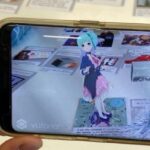With increasing research attention on the application of Augmented Reality (AR) and Game elements in education, fantasy elements as imaginary, fictional game features have been shown to improve learners’ motivation and are critical to engaging and immersive experiences in AR game-based learning. With its affordance of enriching real-life education with virtual effects, AR game-based learning has shown its potential to improve recall performance in previous research. However, educators and researchers have concerns regarding the effect of employing fantasy game elements in AR game-based learning, suggesting learning with such elements will add cognitive load for children leading to a lower recall. To explore the effect of AR and fantasy in game-based learning for recalling declarative knowledge, we conducted an experiment involving 98 children participants and 26 adult participants from the Netherlands and China, using our own designed AR game- ChemiKami AR. We used a mixed ANOVA to identify the effect of fantasy and AR on knowledge recall. This study showed that using AR fantasy in game-based learning can improve recall of declarative knowledge and increase learning effectiveness in classroom learning contexts for children. We offer insights and guidelines for designing AR and fantasy experiences that enhance declarative knowledge recall for target groups with different ages, learning capacities, and cultural backgrounds.
The effect of fantasy on learning and recall of declarative knowledge in AR game-based learning
T. Zuo, M. V. Birk, E. D. van der Spek, and J. Hu, “The effect of fantasy on learning and recall of declarative knowledge in AR game-based learning,” Entertainment Computing, vol. 46, pp. 100563, 2023/05/01/, 2023.
FULLTEXT: PDF REFERENCE: BibTeX EndNote
DOI: https://doi.org/10.1016/j.entcom.2023.100563
